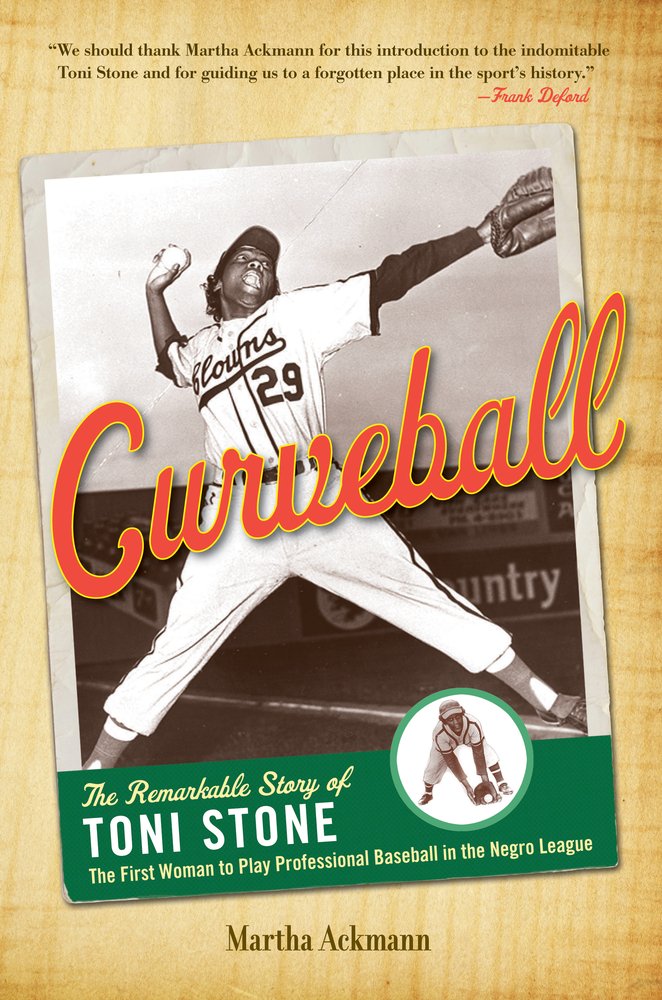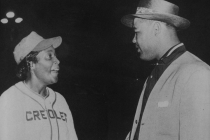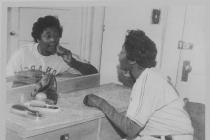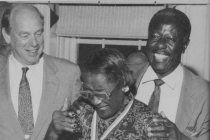Curveball
 Title: Curveball: The Remarkable Story of Toni Stone, The First Woman to Play Professional Baseball in the Negro League
Title: Curveball: The Remarkable Story of Toni Stone, The First Woman to Play Professional Baseball in the Negro LeaguePublished by: Chicago Review Press
Genre: Nonfiction
ISBN13: 978-1613736562
Buy the Book: Amazon, Barnes & Noble, IndieBound, Odyssey Bookshop
Overview
From the time she was a girl growing up in the shadow of Lexington Park in Saint Paul, Minnesota, Toni Stone knew she wanted to play professional baseball. There was only one problem—every card was stacked against her. Curveball tells the inspiring story of baseball’s “female Jackie Robinson,” a woman whose ambition, courage and raw talent propelled her from ragtag teams barnstorming across the Dakotas to playing before cheering crowds at Yankee Stadium. Toni Stone was the first woman to play professional baseball in the Negro League. After Robinson integrated the major leagues and other black players slowly followed, Stone seized an unprecedented opportunity to join the ranks of the pros. She replaced Henry Aaron as the star infielder for the Indianapolis Clowns and later signed with the legendary Kansas City Monarchs. Playing alongside some of the premier athletes of all time including Ernie Banks, Willie Mays, Buck O’Neil, and Satchel Paige, Toni let her talent speak for itself. Curveball chronicles Toni Stone’s remarkable career facing down not only fastballs, but jeers, sabotage, and Jim Crow America as well. Her story reveals how far passion, pride, and determination can take one person in pursuit of a dream.
Critical Acclaim
“We should thank Martha Ackmann for this introduction to the indomitable Toni Stone and for guiding us to a forgotten place in sports history.”
—Frank Deford, sports commentator“Curveball tells the remarkable story of Toni Stone, a trailblazer who broke gender barriers in the world of professional baseball. Her courageous journey and experiences are sure to be an inspiration to anyone seeking to make a way out of no way.”
—Donna Brazile, political strategist and columnist“Martha Ackmann manages to turn Toni Stone from a long-forgotten footnote in baseball history into a multidimensional flesh-and-bone figure. We need to know her story, and in Martha Ackmann’s capable hands, we do. From this time forward it will be impossible to overlook Stone or her heroic contributions to both the national pastime and the cause of women’s rights.”
—Glenn Stout, author of Young Woman and the Sea: How Trudy Ederle Conquered the English Channel and Inspired the World, and editor The Best American Sports Writing“Toni Stone is the dream all little girls dreamed when we ventured to the playground hoping the boys and other big kids would let us play. But Toni didn’t want to ‘play’ she wanted ‘to win.” And that’s a big difference. Martha Ackmann has done a wonderful job telling the story of Toni Stone, this remarkable woman. There are no tears, no quit, no despair in baseball. Stand tall, keep your eye on the prize. SWING!”
—Nikki Giovanni, poet and author of Bicycles
Interviews/Book Reviews
Books in Three Bytes Interview
National Public Radio Interview
Radcliffe Institute Panel Discussion
Gallery
The Story Behind Curveball
I’ve always loved baseball. Watching it. Talking about it. Even playing it. I had my first shot on a team when I was about 10. I couldn’t hit well and my running was awful, but I had a good arm. My friend Patty’s father, Mr. Lawrence, was the coach and he put me in center field. We were not a flashy bunch as the name of our team sponsor would attest: “Flexible Hose.” I think it was a local garden supply store. Try confidently running out to the field with “Flexible Hose” on the back of your uniform. Our team didn’t win many games, but we did have a lot of fun and in the bad, old pre-Title IX days, we also learned a lot about the game--thanks to people like Mr. Lawrence who didn’t write us off because we were girls.
My love affair with baseball that began on Robinwood field back in Florissant, Missouri has never waned. Now that I’m older and live in Massachusetts, I enjoy the game as a spectator. I follow the Cardinals and the Red Sox these days. Lots of ups and downs with those two teams. But once baseball gets in your blood, you can never forsake it—even when things don’t turn out exactly the way you want.
Toni Stone understood the highs and lows of baseball better than most. Toni Stone (1921-1996) was the first woman to play professional baseball in the Negro League. When Henry Aaron moved from the Negro League to the majors, Toni replaced him as the star infielder of the championship Indianapolis Clowns. She played with some of the all-time greats of the game: Ernie Banks, Willie Mays, Buck O’Neil, and Satchel Paige. She played second base for the Clowns and later the legendary Kansas City Monarchs. At one point in the 1953 season, she batted a whopping .364—fourth highest in the league. Baseball historians call her the “female Jackie Robinson” and “the best baseball player you’ve never heard of.”
When I went searching for the subject of my next book, I knew it had to be about baseball. Besides enjoying the game as a fan and a player, I’ve always thought baseball offers an important window into our history and culture. Former baseball commissioner A. Bartlett Giamatti put it well. “Baseball is one of the few enduring institutions in America that has been continuous and adaptable and in touch with its origins,” he wrote. “As a result, baseball is not simply an essential part of this country; it is a living memory of what American Culture at its best wishes to be.”
Toni Stone wanted to play professional baseball more than anything in the world and I knew I wanted to write about her. In over twenty years of barnstorming, semi-pro and finally Negro League baseball, Stone proved that she could compete on men’s teams and handle the skeptics and abuse that often trailed her. “Why don’t you go home and fix your husband some biscuits?!” angry fans yelled at her from the stands. “I’ve heard worse things,” Toni would say. And she was right. Toni followed the same purposeful path that Jackie Robinson traveled several years before in breaking the color line of major leagues. Keep your head down. Concentrate on the game. Let your play prove the bigots wrong.
Writer David Halberstam once observed that behind every great sports story is the story of a nation. And if you consider it—Jackie Robinson, Muhammad Ali, Billie Jean King—I think he’s right. Toni Stone’s story is the story of a nation as well: a nation stuck in the quagmire of Jim Crow, blind to the talents of women athletes, and yet open to one remarkable woman determined to live her dream. "There's got to be a first in everything,” Toni Stone once said. “Maybe it will be me."


